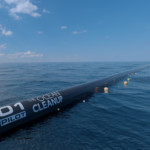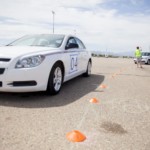
 The Ocean Cleanup , a Dutch foundation that aims to deal with plastics polluting our seas, says it’s finally ready to put its technology to work. In a statement released today, the organization has revealed that it plans to start cleaning up the Great Pacific Garbage Patch in early 2018 using its newly redesigned cleaning system. That garbage patch is the biggest collection of debris in the ocean, a massive soup of visible and microscopic plastic particles poisoning marine life. The ship captain who discovered it in 2003 said he “never found a clear spot” in the week it took to cross the region. While Boyan Slat (the organization’s founder) originally envisioned trapping plastic trash with one large screen tethered to the ocean floor, the new design is smaller, sturdier and can save the group a ton of money. Instead of deploying a 60-mile stationary screen, they plan on releasing 50 smaller ones that measure 0.6 miles in length. They’ll weigh the floating screens down with anchor, so they can move with the currents like plastics do, albeit a bit slower in order to trap debris. Slat told FastCompany that he expected the original design to clean up half of the massive garbage patch in 10 years for $320 million. Now, he expects the new design to cut that timespan in half and to cost the group significantly less than that amount. Since he and his team still need to fund the project, though, they plan to use the plastic they collect to make items they can sell, such as sunglasses, chairs and car bumpers. Source: The Ocean Cleanup
The Ocean Cleanup , a Dutch foundation that aims to deal with plastics polluting our seas, says it’s finally ready to put its technology to work. In a statement released today, the organization has revealed that it plans to start cleaning up the Great Pacific Garbage Patch in early 2018 using its newly redesigned cleaning system. That garbage patch is the biggest collection of debris in the ocean, a massive soup of visible and microscopic plastic particles poisoning marine life. The ship captain who discovered it in 2003 said he “never found a clear spot” in the week it took to cross the region. While Boyan Slat (the organization’s founder) originally envisioned trapping plastic trash with one large screen tethered to the ocean floor, the new design is smaller, sturdier and can save the group a ton of money. Instead of deploying a 60-mile stationary screen, they plan on releasing 50 smaller ones that measure 0.6 miles in length. They’ll weigh the floating screens down with anchor, so they can move with the currents like plastics do, albeit a bit slower in order to trap debris. Slat told FastCompany that he expected the original design to clean up half of the massive garbage patch in 10 years for $320 million. Now, he expects the new design to cut that timespan in half and to cost the group significantly less than that amount. Since he and his team still need to fund the project, though, they plan to use the plastic they collect to make items they can sell, such as sunglasses, chairs and car bumpers. Source: The Ocean Cleanup
Visit link:
50 floating screens will clean the Pacific garbage patch next year
 New submitter troublemaker_23 quotes a report from ITWire: Only 36% of software engineers in India can write compilable code based on measurements by an automated tool that is used across the world, the Indian skills assessment company Aspiring Minds says in a report. The report is based on a sample of 36, 800 from more than 500 colleges across India. Aspiring Minds said it used the automated tool Automata which is a 60-minute test taken in a compiler integrated environment and rates candidates on programming ability, programming practices, run-time complexity and test case coverage. It uses advanced artificial intelligence technology to automatically grade programming skills. “We find that out of the two problems given per candidate, only 14% engineers are able to write compilable codes for both and only 22% write compilable code for exactly one problem, ” the study said. It further found that of the test subjects only 14.67% were employable by an IT services company. When it came to writing fully functional code using the best practices for efficiency and writing, only 2.21% of the engineers studied made the grade. Read more of this story at Slashdot.
New submitter troublemaker_23 quotes a report from ITWire: Only 36% of software engineers in India can write compilable code based on measurements by an automated tool that is used across the world, the Indian skills assessment company Aspiring Minds says in a report. The report is based on a sample of 36, 800 from more than 500 colleges across India. Aspiring Minds said it used the automated tool Automata which is a 60-minute test taken in a compiler integrated environment and rates candidates on programming ability, programming practices, run-time complexity and test case coverage. It uses advanced artificial intelligence technology to automatically grade programming skills. “We find that out of the two problems given per candidate, only 14% engineers are able to write compilable codes for both and only 22% write compilable code for exactly one problem, ” the study said. It further found that of the test subjects only 14.67% were employable by an IT services company. When it came to writing fully functional code using the best practices for efficiency and writing, only 2.21% of the engineers studied made the grade. Read more of this story at Slashdot. 